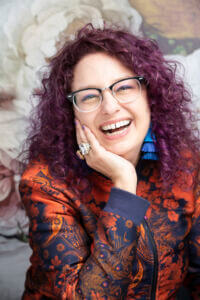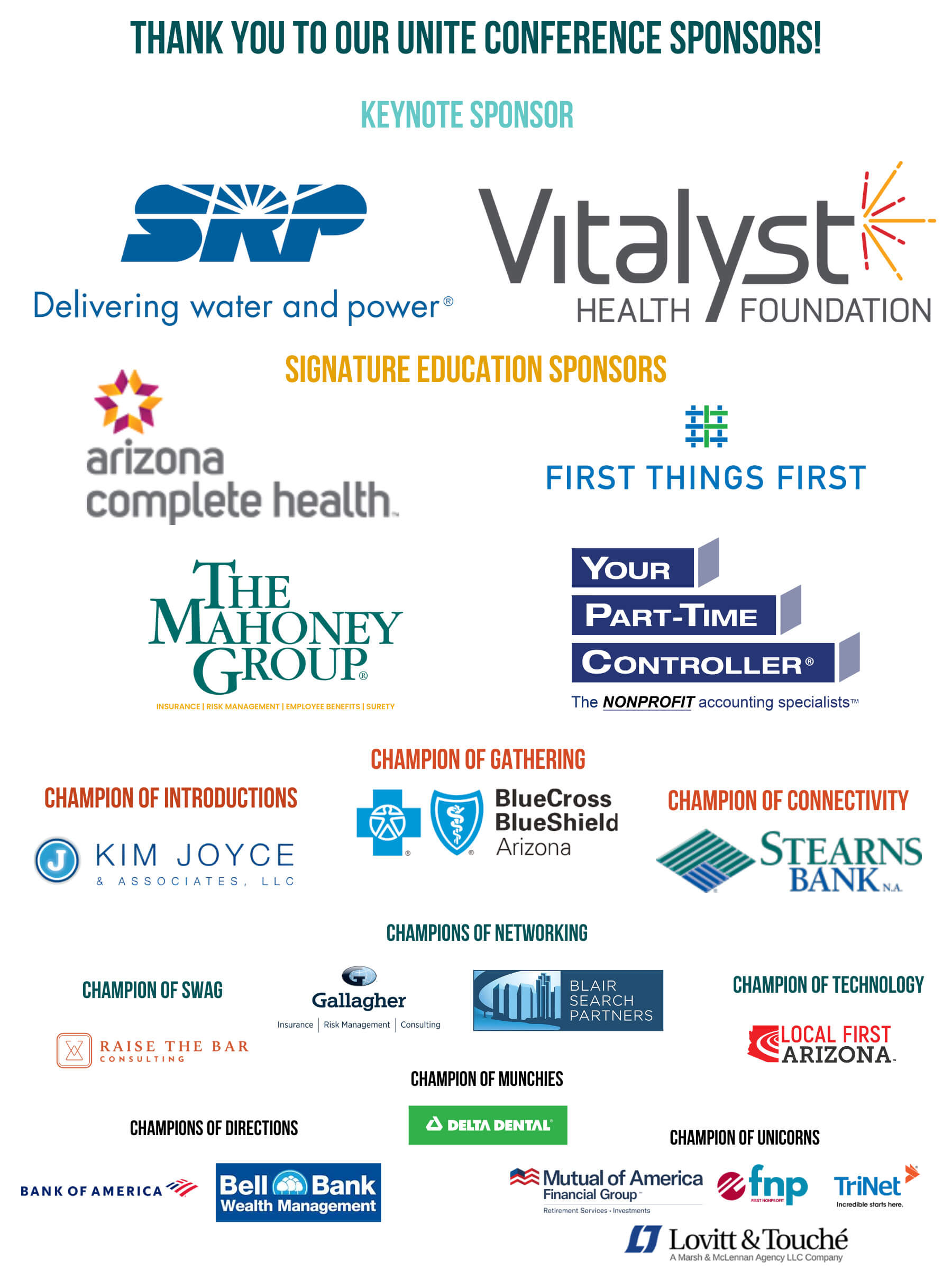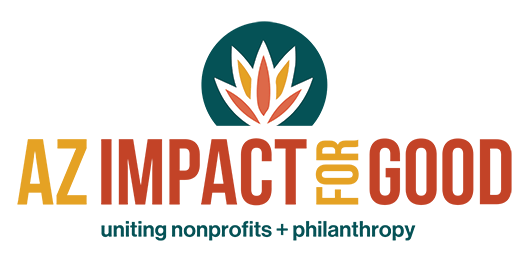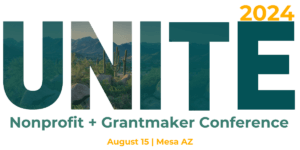2024 UNITE Sessions and Speakers
Keynotes
Hooray for failure! There is one thing for certain in our lives and projects: at some point, we will fail. Whatever the loss or failure, there are ways to manage and achieve success from challenges, as long as we plan ahead for these challenging times. And if we are to shape the future and build on our triumphant teams, we need to leverage the lessons of loss and failure with the talents of our colleagues. In this energetic, dynamic, and hilarious keynote, using real examples from Arizona institutions and beyond, we will discuss why failure can be absolutely fabulous in our organizations, teams, and jobs, and how to create mechanisms so that we can spot, address, learn from, and move on from failure. Let's fail forward and reframe failure to fuel innovation! In this fun (and funny!) keynote, participants will:
- Gain a data-driven framework to reframe and shift failure into growth opportunities for your organization, team, and project
- Learn techniques to identify where and when failure could occur and train yourself and your team to implement a strategy to enable success in a challenge
- Discover a process-oriented approach to navigating any kind of professional failure, loss, or challenge
- Understand the lesson of failure to make us stronger and more agile, creative, communicative, and ultimately more victorious in our jobs and contributions to our institutions and the Arizona non-profit community!
Keyno te: Alaina Levine Bio
te: Alaina Levine Bio
Alaina G. Levine is an award-winning keynote speaker, career coach, speaking coach, TEDx speaker, science writer, and corporate comedian. She is the author of two books, Networking for Nerds (Wiley), which beat out Einstein (really!) for the honor of being named a Top 5 Book of the Year, and Create Your Unicorn Career! (forthcoming). As President of Quantum Success Solutions, LLC, she is a prolific speaker, emcee, and expert on career and workforce development, networking, and leveraging failure for innovation. Alaina has delivered ~1000 speeches for clients in 15 nations, 35 states, and 5 continents, and has written close to 500 articles in publications like Science, Scientific American, National Geographic News Watch, World Economic Forum, and Smithsonian, including her popular “Your Unicorn Career” column, which appeared in the Number one science journal in the world, Science Magazine.
As a career coach, she has helped hundreds of professionals create and land their Unicorn Career, the customized, authentic career that brings you joy, meaning, and money, and as a speaking coach, she has helped professionals improve their public speaking skills to increase their advocacy and influence, and land fat stacks of funding. Recent projects included coaching UA professors to land $120 Million from the NSF and NIH, and working with NASA to provide pitch coaching to STEM students from Minority Serving Institutions (MSIs) who are competing for $300k in seed funding in a national NASA Incubator challenge. Previously, Alaina managed a master's program in science and business and taught entrepreneurship to STEM grad students at the UA as an Eller Entrepreneurial Scholar. She studied at the American University in Cairo as a US Department of Defense Boren Fellow, and holds bachelor’s degrees in mathematics and anthropology from the University of Arizona, where as a student, she competed in national billiard tournaments under her moniker, Lady Dyn-o-mite.
Traditional approaches to social impact are not solving our world’s most complex challenges. What we need is a shift in the system and it’s going to take all of us. This session will introduce the concept of systems and systems thinking, highlighting the often implicit conditions holding problems in place. We’ll explore the central role of collaboration to drive any systems change effort and discuss both common pitfalls and opportunities when we seek to collaborate—particularly across lines of difference. Whether you’re exploring a new collaborative initiative or you’re deeply engaged in an existing effort, participants will come away with practical tips and strategies for more effectively collaborating to advance lasting change.
 Keynote: John Harper Bio
Keynote: John Harper Bio
John Harper is the CEO of FSG, a global nonprofit consulting firm that partners with foundations and corporations to create equitable systems change. Throughout his career, John has been a thoughtful and inclusive leader with a deep commitment to advancing equity, shifting power, and uplifting the voices of historically marginalized communities. At FSG, John has successfully led engagements with notable organizations such as W.K. Kellogg Foundation, the Cleveland Foundation, Ares Charitable Foundation/Ares Management, the James S. McDonnell Foundation, and numerous multinational corporations. Prior to joining FSG, John worked in the nonprofit sector for over a decade, leading strategy and development for both direct service and field-building nonprofits. As a highly sought after speaker, he regularly writes and speaks on topics of systems change, place-based philanthropy and collaborative civic infrastructure, and translating global corporate purpose into local impact.
9:30AM - 10:45AM Breakout Sessions
As the year draws to a close, nonprofits face the critical challenge of creating impactful year-end fundraising campaigns that resonate with supporters and drive meaningful results. In this presentation, we'll explore how artificial intelligence (AI) is revolutionizing year-end giving, empowering organizations to create more personalized, engaging, and effective fundraising experiences. We'll delve into real-world examples of how AI-driven insights and data-informed strategies can help nonprofits transform their year-end campaigns, allocate resources more effectively, and maximize their fundraising potential. We'll also discuss how these cutting-edge AI tools can help nonprofits build lasting relationships with their supporters, fostering a shared purpose and commitment to driving positive change. Whether you're a seasoned fundraising professional or new to the world of nonprofits, this presentation will provide valuable insights, practical strategies, and inspiring examples of how AI can empower your organization to create more impactful year-end campaigns.
Key Takeaways:
- AI in Fundraising: Understand AI’s role in transforming and optimizing year-end fundraising campaigns.
- Enhanced Donor Insights: Use AI to gain deeper insights into donor behavior and create personalized narratives.
- Efficient Campaigns: Implement AI for quick setup, automated segmentation, and maximizing campaign potential.
- Building Relationships: Leverage AI to foster lasting donor relationships and analyze successful real-world examples.
- Future Trends: Explore future trends and the evolving impact of AI on fundraising.
Speaker: Kathleen Celmins (The Well-Paid Expert)
Key Takeaways:
- Engaging Millennials and Gen Z: Learn how to effectively engage Millennials and Gen Z in exploring and improving their financial knowledge.
- Benefits of Financial Education: Discover how offering financial education options for staff can enhance your organization’s mission.
- Education Options Available: Review different options for providing financial education to your staff.
“If you don’t have a seat at the table - you’re on the menu.” That is a somewhat familiar political saying. The implication is that if you are not in the room, seated at the table, when policy makers are deciding what issues to support - then they will have you for the meal. You will be presented with the ingredients to be an even more effective and influential advocate. Preparing you for success. The key ingredients, the action plan for advocacy success is in the 7 Actions of Highly Effective Advocates. These are actions and not steps. You can use one, two, three, or all of these actions. These 7 actions will act as your ingredients for advocacy success. So that you will have a seat at the table and your issues on the menu, prepared by you, with your interests being heard. You the citizen, hold the influence – it’s your power of personal persuasion – when you use it.
Key Takeaways:
- Role in Communication: Recognize your crucial role in communicating with key stakeholders, including elected officials.
- Advocacy Tree Branches: Discover the 7 Branches of the Advocacy Tree and understand their purposes.
- Advocate vs. Lobbyist: Learn the differences between effective advocates and lobbyists.
- Effective Advocacy Actions: Engage in and learn the Seven Actions of Highly Effective Advocates.
Speaker: Roger Rickard (Voices in Advocacy)
In a sector built on impact, inclusive philanthropy offers a way forward built on compassion and careful practice. But how can practitioners take this work from idea to implementation? In this session, we'll delve into the importance of inclusive practices in philanthropy, addressing systemic barriers and amplifying underrepresented voices.
Key Takeaways:
- Importance of Inclusive Practices: Understand the role of compassion and inclusive practices in philanthropy, addressing systemic barriers and amplifying underrepresented voices.
- Strategies for Equitable Giving: Learn strategies to foster equitable giving, build positive workplace culture, and promote inclusive community building.
- Practical Tools and Frameworks: Gain practical tools and frameworks to cultivate a culture of inclusivity in philanthropic initiatives.
- Effective Outreach: Explore outreach strategies that connect with diverse communities, incorporating their experiences and perspectives.
- Engaging Diverse Stakeholders: Equip yourself to engage diverse donors and stakeholders effectively for greater impact and stronger community connections.
Building lasting relationships with your donors, the people you serve, and internal teams is more difficult than ever, given the distractions of the world and the many different organizations vying for their attention. In this interactive session, reframe how you think about your audience, and learn how to better connect with them. You’ll walk away with a repeatable 4-step strategy for creating committed, loyal supporters. You’ll also learn different ways of connecting with them and get tips for how to tell better stories. You’ll leave with several different examples of other organizations with highly engaged and responsive audiences. .
Key Takeaways:
- Reframe Audience Perspective: Change how you view and understand your audience.
- Enhance Connection: Learn techniques to better engage with your audience.
- 4-Step Communication Strategy: Present and explain a repeatable 4-step strategy for connecting with and communicating to loyal supporters.
- Storytelling Tips: Receive practical tips for improving your storytelling.
- Practical Exercise: Participate in an exercise applying the 4-step strategy.
Speaker: Emily Soccorsy (Root + River)
There are many basic resources for nonprofit boards, but how do you find innovative and effective tools that match your organization’s lifecycle, resources and strategic direction? In this workshop, we will go beyond the basics providing you with tools to reimagine three common challenges of shared leadership between the board and the executive, board composition, recruitment and succession planning. Attendees will create components of their customized board plan. Participants will receive templates, resources and new ideas to incorporate into practice.
Key Takeaways:
- Shared Leadership Structure: Develop a structure for shared leadership and alignment between the Executive Director and Board, using tools like the Responsibility Chart.
- Reimagine Board Recruitment: Redesign board composition and recruitment strategies with tools such as the Experience Wheel.
- Board Succession Planning: Create an effective board succession plan using the Talent Plan tool.
Speakers: Liz Kinsfather, Tiffanie Dillard (Avenir Consulting Partners) & Colleen Conley, Amanda Kaye (CKSynergy Consulting)
Estimates suggest that up to 75% of U.S. nonprofit leaders are planning to leave their positions in the next five to ten years and only 29% of organizations have transition plans. In Arizona alone that equates to approximately 21,750 nonprofits in leadership transition over the next five to ten years. These statistics suggest that nearly 71% of those organizations are unprepared for such transitions. It is also estimated that the turnover rate for nonprofit executive directors is 18% to 22% annually. Considering this rate, organizations can expect to navigate a leadership transition every 4-5 years. These statistics point to the importance of planning and preparation for leadership transitions. Executives direct and guide all aspects of organizations. How and when a leader exit reverberates throughout the organization, often reaching into the community and the field. Planning for leadership transitions can negate the disruption to strategy, programming, and revenue streams. Whether an exit is planned or unplanned, it can take longer than anticipated to fill the top job, and during the hiatus it’s important to keep operations running smoothly. Transition plans are like having insurance, they can help create a smooth transition for all stakeholders within and outside the organization. This interactive workshop provides an opportunity for Grantmakers, Executive Directors, Board of Directors, and other leaders to deepen their understanding of organizational resilience and sustainability by assessing the transition readiness of an organization. It is designed to provide an overview of research, tips, and tools to prepare organizations for leadership transition.
Key Takeaways:
- Define Leadership Transition: Understand what leadership transition is and identify the elements needed for successful transitions.
- Assess Transition Readiness: Evaluate an organization’s readiness for leadership transition.
- Prepare for Transition: Explore strategies to effectively prepare an organization for a leadership transition.
Speaker: Kim Madrigal (Madrigal Consulting and Counseling), Maria Camila Englert (Western Alliance Bank) and Michelle Bradshaw (SAFE Credit Union)
Join us for an illuminating session where we explore the dynamic relationship between journalism and philanthropy in today's rapidly evolving landscape. This forum will feature discussions on innovative collaborations, impactful storytelling, and the intersection of media and charitable initiatives. Our panel of experts will share insights on leveraging journalism to amplify philanthropic efforts, navigate ethical considerations, and foster informed communities.
Key Takeaways:
- Enhancing Impact through Media Partnerships: Learn strategies for integrating journalistic storytelling with philanthropic missions to maximize social impact.
- Ethics and Integrity in Philanthropy-Funded Media Projects: Explore best practices and considerations for maintaining journalistic independence and credibility in philanthropic collaborations.
- Innovative Funding Approaches for Media Sustainability: Discover new models and funding strategies that support the sustainability and independence of journalistic endeavors.
- Community Engagement and Empowerment: Hear case studies on successful initiatives that have empowered communities through philanthropy supported media and journalism.
- Interactive Discussion and Q&A: Engage directly with our panelists to deepen your understanding and explore practical applications of journalism in philanthropic endeavors.
Join us for a thought-provoking discussion that will inspire new perspectives and strategies for leveraging journalism and philanthropy to drive positive change.
Panelists: Stacy Sullivan (Flinn Foundation, previously The Arizona Republic), John Amoroso (Community Foundation for Southern Arizona) & Chris Kline (Arizona Media Association/Arizona Local News Foundation)
Moderator: Susan Casper (Arizona's Family)
1:00PM - 2:15PM Breakout Sessions
Playworks has been a leader in play for over 25 years! Join us as we share some of our best practices of play and how you can bring play into your organization as a tool to build relationships with staff and help develop a strong team. The same skills learned from play such as teamwork, conflict resolution and communication are all skills of effective teams. This is a lively and inclusive workshop filled with play that will help give you tools to increase employee satisfaction and collaboration to strengthen your team health.
Key Takeaways:
- Benefits of Play: Discover how play enhances team health, staff retention, and employee engagement.
- Teambuilder Games: Leave with 1-2 team-building games to implement with your team.
- Best Practices: Learn best practices for incorporating play into your team culture.
Speakers: Lisa Paulos & Erin Mahoney (Playworks Arizona)
This workshop will tell the story of an organization’s awakening and implementation of an equity integration staff team. Learn how one small nonprofit took steps from assessment to integration as part of a collective journey to aligning its mission to social justice principles for the benefit of its target population. Explore key insights for the Free Arts journey and reflect on your personal and organizational effort toward greater equity.
Key Takeaways:
- Reflect on Equity Participation: Assess personal and organizational involvement in equity work within the nonprofit sector.
- From Dialogue to Action: Understand how to advance organizational equity strategies from discussion to assessment and integration.
- Lessons from Implementation: Reflect on key lessons learned from implementing the Free Arts’ Equity Integration Team.
- Personal and Organizational Equity Journey: Evaluate personal and organizational equity progress, articulate a vision, and identify limitations in implementation.
Speakers: Matthew Sandoval & Marisa Skelpsa-Munoz (Free Arts for Abused Children of Arizona)
Today's landscape finds nonprofits in a perfect storm with greater demands for services, fewer donors, higher costs, increasing salaries, higher turnover and a shortage of qualified development professionals. This workshop will discuss the opportunities for nonprofits to utilize the expertise of highly qualified professionals who know how to move the needle at fraction of the cost and time. Fractional fundraisers are ideal for non-profit organizations that need to build or scale their fundraising activities but have no dedicated fundraiser on staff. This will also work for organizations that have a small or junior fundraising team but require high-level strategy, planning or guidance. With limited budgets and growing salaries, many nonprofits are forced to hire a junior fundraiser who may not have the breadth of experience required to develop or scale critical fundraising systems and practices. This results in putting too much pressure on someone who is new to the profession and often leads to job dissatisfaction, burn-out and turnover. Additionally, to build a diversified and sustainable foundation of fundraising practices takes a lot of knowledge, an understanding of all the moving pieces and the ability to put the plans into action. Utilizing a fractional fundraiser provides the perfect mix of high-level customized strategy and the actual work of fundraising. They also bring a wide range of experience that makes them great problem-solvers and valuable helper-outers.
Key Takeaways:
- Understanding Fractional Fundraising: Learn what fractional fundraising is and how it works.
- Benefits for Nonprofits: Discover the advantages of using fractional fundraising services.
- Roles of Fractional Fundraisers: Explore the various roles that a fractional fundraising professional can fill.
- Assessing Fit: Determine if fractional fundraising is a suitable option for your nonprofit.
Speakers: Michele Rebeor & Alan Knobloch (Synergy Philanthropy)
Ready to revolutionize giving? This session dives into the cognitive science of donor engagement unveiling community-centered fundraising strategies that forge alliances between nonprofits and funders. We'll deconstruct deficit-framed narratives, elevating community strengths and aspirations, to significantly shift how we communicate with donors. We’ll explore how intuition over reason, negative bias phenomenon, and fundamental attribution error creep into our storytelling, and learn small but powerful language tweaks to disrupt these patterns. You’ll leave knowing how to craft ethical narratives that uplift, have deeper donor discussions that lead to long-term collaborations, and set in motion systemic transformation for communities to thrive.
Key Takeaways:
- Cognitive Science in Donor Engagement: Understand key principles influencing donor behavior, like intuition vs. reason and cognitive biases.
- Deficit-Framed Narratives: Learn to identify and transform deficit-framed language into asset-based, strength-focused narratives.
- Ethical Storytelling: Develop frameworks for ethical and empowering narratives that build community and donor connections.
- Community-Centered Fundraising: Gain practical strategies for community-centered fundraising that align with ethical practices and support systemic change.
Speaker: Frank Velásquez Jr. (4 Da Hood)
In the heart of our work, where passion fuels progress, it's easy to lose sight of the spark that ignited our journey. This session delves into the profound significance of discovering and nurturing your "why" – the driving force behind your commitment to making a difference. Through a blend of personal anecdotes, insightful reflections, and practical exercises, we'll embark on a transformative exploration of:
Key Takeaways:
- Unmasking Your Core Values: We'll peel back the layers to uncover the deeply held beliefs that shape your worldview and guide your actions.
- Connecting to Your Personal Narrative: By tracing the threads of your unique experiences, we'll illuminate the defining moments that led you to this path.
- Aligning Passion with Impact: We'll delve into the intersection of your passions and the tangible outcomes you strive to achieve in your work.
- Staying Inspired: We'll equip you with strategies to navigate challenges, rekindle enthusiasm, and sustain your dedication in the face of adversity.
- Cultivating a Community of Purpose: We'll explore how fostering meaningful connections with like-minded individuals can amplify your impact and ignite collective action.
Whether you're a seasoned professional or a newcomer to the field, this session will empower you to rediscover your "why," re-energize your commitment, and lead with renewed purpose in your pursuit of a better world.
Speaker: Jake Hylton (LOOKOUT Publications)
A crisis can come from any direction but most organizations are focused on serving the community. What would you do if your organization was accused of fraud, lies, or a coverup? A single news story or social media post can spread like lightning - amplifying falsehoods, altering public perception, and jeopardizing your organization's reputation and future community impact. This presentation will share PR secrets so you’re ready for an attack from any direction - the public, a disgruntled community member, or an anonymous source. It will equip leaders with critical skills and strategies for a rapid response to protect their people and shut down falsehoods with speed and confidence. Attendees will get practical, actionable insight on how to act decisively and communicate effectively under pressure to comfort board members, and donors and ease city or state concerns. Our immediate response strategy will also cover key steps including who to contact immediately, what to say to volunteers, how to funnel criticism, and when it’s better to give an interview than issue a statement. This session is for organization leaders, and PR/marketing teams who want to learn how to emerge from a crisis without long-term damage to their reputations.
Key Takeaways:
- Crisis Preparedness: Prepare a list of potential crises that could damage reputations.
- Template Statements: Develop template statements for use during any crisis situation.
- Media Strategies: Harness traditional and social media to build support and manage public perception.
Speaker: Josh Weiss (10 to 1 Public Relations)
Join us for an interactive workshop focused on empowering individuals through effective goal setting strategies. Explore innovative approaches that transcend binary outcomes, emphasizing growth and continuous improvement. Delve into common obstacles in goal achievement and learn practical strategies to navigate challenges effectively.
Key Takeaways:
- Broaden Goal Perspectives: View goals as more than binary outcomes and understand their broader implications.
- Embrace Breakdowns: Recognize breakdowns as natural parts of the goal-setting process and opportunities for personal growth.
- Navigate Goal Challenges: Identify common breakdowns in goal achievement and learn effective strategies to address them.
Speakers: Mark Garcia & Briana Clark (New Pathways for Youth)
- Trust-Based Philanthropy's Influence on Giving Strategies: Discover how this approach is transforming donor-recipient relationships and fostering more effective collaboration.
- Defining and Measuring Meaningful Impact: Learn the latest methodologies for assessing the real-world effects of philanthropic initiatives.
- Covering Administrative Costs: Understand the critical role that operational expenses play in sustaining impactful programs and how to address them in funding proposals.
- Meeting Community Needs and Lessons Learned: Gain practical insights from funders on successfully identifying and responding to the evolving needs of communities.
- Interactive Q&A Session: Engage directly with our panel of experts, getting your questions answered and exploring topics in greater depth.
2:45PM - 4:00PM Breakout Sessions
A Unicorn Career is a customized career, fully aligned with your authenticity, that brings you joy, meaning, AND money (because you should be paid appropriately for your contributions to Arizona, society, and the community). Anyone can create their own Unicorn Career, but it starts with identifying pain points in systems that you are uniquely positioned to alleviate. In this breakout session, you will engage, laugh, and learn as we leverage a data-driven process to launch and grow Your Unicorn Career, and discover how you can turn your current role into Your Unicorn Job! When we aim to be our full selves, 100% of the time, we bring our best work, innovations, and dedication to the community, our clients, donors, stakeholders, boards, and colleagues. Learn how to Create Your Unicorn Career...and how you can enable your colleagues' triumphs in their career development, too.
Speaker: Alaina Levine (Speaker, Coach & Author of Create Your Unicorn Career)
Key Takeaways:
- Types of Budgets: Understand different budget types and their uses.
- Budget Process: Overview of the nonprofit budgeting process.
- Financial Sustainability: Strategies to enhance financial stability.
- Management Tool: Use the budget effectively for management and decision-making.
This session will dive deeper into systems thinking, leveraging FSG’s Six Conditions of Systems Change to better understand the complex social problems we seek to solve and what might be holding these seemingly intractable problems in place. During this interactive workshop, participants will have the opportunity to practice applying a systems lens to diagnose the problem their work seeks to address and identify opportunities to incorporate systems change strategies into their efforts moving forward.
Speaker: John Harper (FSG & Collective Impact Forum)
Ever feel like you put your needs to the back-burner in service of the important mission that drives you? Ever feel like you are spread too thin constantly striving to do as much good as possible? Ever wish you could clone yourself to take care of your never-ending to do list? Burnout and compassion fatigue plague mission-driven people just like you or those you lead. And the mission you serve depends entirely on your individual and collective resilience. We’ve been told that resilience means tirelessly bouncing back and pushing through - but that just leaves us all feeling more tired. There is only so much bouncing back we can do! Thankfully, resilience is more simple and much easier than that. As a resilience coach for nearly a decade, Alison Smith has spent thousands of hours coaching clients experiencing burnout and compassion fatigue in a variety of fields and functions. And as a fellow human, she’s been there too. Alison will share what she has learned about the power of small acts of resilience as a way to ultimately design your life and work so you can THRIVE.
Key Takeaways:
- To redefine resilience from merely powering through challenges to drawing strength from within during them.
- To understand how small acts of self-connection, when practiced consistently, can help mission-driven professionals overcome compassion fatigue.
- To learn and apply the seven most powerful methods for cultivating individual and team resilience while embracing the "BE HUMAN" approach.
Speaker: Alison Smith (The Thrive Designer)
This session covers common misconceptions about grant writing, strategies for successful grant writing techniques, funder trends, the value of relationship building, and helpful ways to measure the success of a grants program beyond the success rate of proposals.
Key Takeaways:
- Common Misconceptions: Identify prevalent myths about grant writing.
- Successful Grant Writing Strategies: Learn effective strategies for writing successful grants.
- Funder Trends and Relationships: Understand the significance of tracking funder trends and building relationships.
- Measuring Success: Discover how to assess the success of your grants program.
Speaker: Harmony Nelson, GPC (Kim Joyce & Associates)
Key Takeaways:
- Modern Donor Relations: Gain an understanding of contemporary approaches to managing donor relationships.
- Classical Approaches: Appreciate classical donor relations methods and their enduring value.
- Donor Motivations: Develop a deeper understanding of what drives donor motivations.
- Overcoming Fundraising Challenges: Address and overcome fears or reluctance in fundraising efforts.
- Peer Learning: Learn from the experiences and insights of other workshop attendees.
The well-being of individuals, teams and organizations has become a hot topic. Gallup surveys show that large percentages of employees do not believe their organizations care enough about their well-being. Mindfulness exercises are often identified as something organizations can offer their employees. However mindfulness and stress reduction is often practiced as a way of relieving stress after the fact. This session is intended to show that mindfulness practices are even more effective when learned with the intention of using them while in action, even during high stress situations. We will also draw the connection between well-being practices and effective leadership.
Key Takeaways:
- Achieve Deep Relaxation: Learn techniques to guide yourself or your team into a fully relaxed state.
- Experience State Differences: Feel and describe the contrast between a typical aroused work state and a fully relaxed state.
- Discover Centeredness: Explore what it means to be centered and how to maintain this state.
- Understand and Mitigate Stress: Gain insights into the sources of stress and how to use relaxation tools to manage it effectively.
- Develop Leadership Capacities: Understand two critical embodied capacities that enhance purpose-centered leadership.
Speakers: Timm Esque & Amanda Stradling (East Valley Leadership Laboratory)





